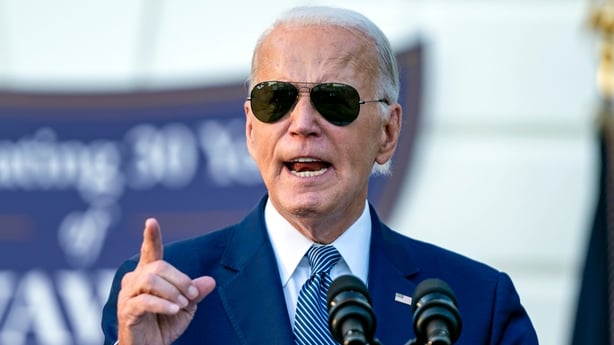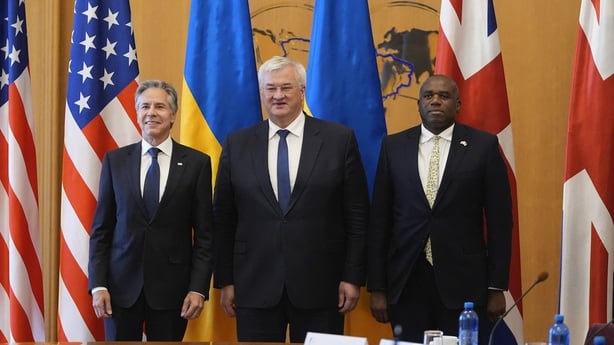British Prime Minister Keir Starmer and US President Joe Biden will discuss whether to let Ukraine use long-range missiles against Russia, in what is likely to be their last meeting before an election that could upend US policy in the country.
Ukraine is pushing the US and UK to lift a restriction on firing arms made by both countries, with Russian President Vladimir Putin warning that giving Ukraine the green light would mean NATO was "at war" with Russia.
However, the White House said this evening that the US has not changed it's position on the use of long-range weapons by Ukraine and that it does not expect to make any announcement on the matter today.
This seems to be at odds with reports in British media that Mr Biden, who is wary of provoking a nuclear conflict, was ready to let Ukraine deploy British and French missiles using US technology but not US-made missiles themselves.
The White House also said that it took seriously the warning from Russian President Vladimir Putin over the consequences of Ukraine using long-range missiles.
The US-UK talks come as Joe Biden enters the months of his presidency, with November's election a toss-up between his Vice-President Kamala Harris and Republican Donald Trump.
We need your consent to load this rte-player contentWe use rte-player to manage extra content that can set cookies on your device and collect data about your activity. Please review their details and accept them to load the content.Manage Preferences
Mr Trump repeatedly refused to take sides on the war during a debate with Ms Harris, saying only: "I want the war to stop."
Pope Francis has appealed to US Catholics to "choose the lesser evil" when they vote in November, without elaborating.
He criticised both candidates, and took aim at Donald Trump over his plan to deport millions of immigrants, saying that it was a "grave" sin not to welcome them to the US.
Mr Starmer is set to meet the US President in the Oval Office this evening but has no scheduled meetings at this stage with Mr Trump or Ms Harris, both of whom will be on the campaign trail.
"These are strategic meetings to discuss Ukraine and to discuss the Middle East, and so it'll be at that level of strategic discussion that we'll be involved in ... with the president," Mr Starmer said.

Mr Starmer's visit comes as Russia's FSB security service announced that the accreditation of six British diplomats had been withdrawn for suspected espionage and for "threatening Russia's security".
"As a measure of reprisals to the multiple unfriendly acts of London, the Russian foreign ministry ... has withdrawn the accreditation of six employees from the political department of the British embassy in Moscow," it said in a statement, accusing them of carrying out "subversive activities and intelligence" gathering.
Mr Starmer's second to Washington since becoming prime minister is also aimed at papering over differences on the war in Gaza.
Last week, the UK government announced restrictions on some weapons to Israel, voicing concern that they could be used to violate international humanitarian law.
The White House has declined to criticise Britain's decision, but Politico reported that the US had asked the UK what it would take to change its decision, with the answer being a ceasefire in Gaza.
Read more about Russia's invasion of Ukraine
'War with Russia'
However Ukraine will be the main focus, amid mounting concerns over the country's losses on the battlefield more than two-and-a-half years into the war.
Mr Biden said that he was "working" on Ukraine's demands, while top US and British diplomats Antony Blinken and David Lammy made a rare joint visit to the nation earlier this week.

Mr Blinken promised that the US would now quickly review Ukraine’s long-standing request and would "adjust, we'll adapt as necessary" to help the war-torn country defend itself.
The US currently authorises Ukraine to only hit Russian targets in the occupied parts of its territory and some in Russian border regions directly related to Russia’s combat operations.
However Mr Putin warned the United States and United Kingdom against such a move.
"This would, in a significant way, change the very nature of the conflict. It would mean that NATO countries, the US, European countries, are at war with Russia," Mr Putin said.
The US president has strongly supported Ukraine since Russia's invasion to the tune of billions of dollars in aid as well as political capital at home.
But he has been risk-averse about stepping up to new kinds of weaponry deliveries, with Ukraine having to wait until this year to get F-16 jets.
The looming US election means the clock is ticking, with Ukraine in particular eyeing a Trump presidency with trepidation.
Mr Trump has long been lukewarm on supporting Ukraine, and has frequently praised the Russian president.
In his debate with Ms Harris, he pledged to get an agreement to end the war "before I even become president" - a deal many Ukrainians fear would force them to accept Russia's territorial gains.
US Vice President Harris has in contrast pledged to keep up staunch support for Ukraine if elected.

